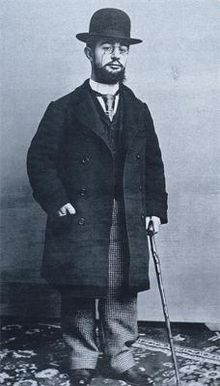It’s two lose, Lautrec! ~ (pun intended)

Your Tax Dollars at Work
Yes, of course, it’s the former. Millions of Americans can’t tell, thanks to the public schools and their waste of your money.
So here’s where we end up. Many allegedly educated Americans cannot avoid the simplest grammatical and spelling mistakes. Clearly, they have never been taught right from wrong, linguistically speaking.
Here are the most common examples now disfiguring blogs and comments by the billions: it’s or its? Who’s or whose? Know or no? Your or you’re? Too, to, or two? Their, there, or they’re? Loose or lose?
There are only a few of these dilemmas. The differences are obvious. They could be easily taught if someone bothered. Each day, students would write simple sentences using these words. By the end of the week, they would know them forever.
What have our schools done instead? They have engaged in a phony 75-year debate against the teaching of grammar and spelling, actually arguing that teaching something to children guarantees that they won’t know it.
Please note the irony. Instead of taking a few hours to teach these things, our self-appointed experts waste hundreds of hours perpetuating sickly little sophistries to justify keeping children ignorant. That is the idiocy of our Education Establishment on full parade.
The good news is that people reading this column can participate personally in the inanity of K-12. Before, you may have experienced the weird excesses at a safe distance. Now you can wallow in them. Maybe if enough people express indignation, our so-called educators will start doing their job.
Here are some goofy titles, followed by their goofy articles, that illustrate the Anti-Grammar Crusade that has so befuddled what we once called Western civilization.
Is Teaching Grammar Necessary?
Over the years, the teaching of grammar has continued to be prominent in English and foreign language instruction, leaving less class time or student energy for students to speak, read, or write in those languages. … [S]tudies have produced some clear and unequivocal conclusions: The teaching of formal grammar does not help a student’s ability to speak, to write, to think, or to learn … languages.
Lessons in spelling ‘have no place in 21st century schools’
Schools should stop providing lessons in spelling and grammar because children can correct linguistic errors on their mobile phones, according to a leading academic[.] … Sugata Mitra, professor of educational technology at Newcastle University, said good spelling and grammar was necessary “maybe a hundred years ago” but “not right now.”
Education, just the facts. Here’s why rote learning is wrong
I feel like a lot of people think that memorizing trains your brain, or helps you become better at learning, but, ultimately, there isn’t any evidence that memorizing makes you any better at learning.
The Wrong Way to Teach Grammar
No more diagramming sentences: Students learn more from simply writing and reading[.] … Happily, there are solutions. Just as we teach children how to ride bikes by putting them on a bicycle, we need to teach students how to write grammatically by letting them write.
To Grammar or Not to Grammar: That Is Not the Question!
For most students, teaching grammar as sentence analysis is another reason why the grammar doesn’t transfer to student writing[.] … Both our personal teaching experiences and the findings of research studies support the conclusion that most students do not benefit from grammar study in isolation from writing.
Why Don’t U.S. Schools Teach Grammar?
The more researchers conducted studies looking for good reasons to teach grammar, the more they started to wonder whether any such reasons actually existed. This growing current of skepticism culminated in 1963 with a report titled Research in Written Comprehension. Looking at studies that had been done up to that point, the report concluded that “the teaching of formal grammar has a negligible or, because it usually displaces some instruction and practice in actual composition, even a harmful effect on the improvement of writing.” In other words, the report passed a harsh verdict: teaching grammar is at best a waste of time and at worst something that actually hurts students[.] … By 1985, the National Council of Teachers of English (NCTE) had adopted a resolution explicitly discouraging “the use of isolated grammar and usage exercises not supported by theory and research,” instead urging that “class time at all levels must be devoted to opportunities for meaningful listening, speaking, reading and writing.” The resolution also called on teachers to stop giving tests focused on grammar rather than the more general “language arts.”

Henri de Toulouse-Lautrec
Okay, let’s conduct two thought experiments. Suppose you have concocted all these cute little theories to justify not teaching grammar, and then you see the collapse of even rudimentary skills among the public. Emails and forums make this decline obvious. Would you relent? Would you give up your blatantly destructive sophistries? Not, apparently, if you expect to rise to the top in our Education Establishment.
Suppose you were a hostile foreign power trying to subdue this country. Wouldn’t you engage in exactly this anti-grammar, anti-spelling folderol with the goal of increasing chaos, miscommunication, and disarray – in short, all the qualities we want to see in an opposing army?
To repeat an earlier point, the difference between your and you’re is no big deal, much like the difference between 15 and 16. Children should not move on until they have mastered such basics, whether numbers or letters. Students merely have to write these things out several times, use them in simple sentences, do that for a while, and they will own them. In any case, somewhere in middle school and certainly high school, there should be a review, a careful taking of stock. Do kids know the difference between your and you’re? If not, stop everything and fix the problem. Our brave educators resolutely refuse.
Another sick irony is that even as children are kept from memorizing correct usage, most are typically forced into memorizing hundreds of sight-words, a vastly more difficult project.
Notice how desperately our anti-American cohorts want to hurt us. They blather on year after year, claiming things that are totally absurd. You don’t need to know spelling and grammar. If you try to learn them, you will be worse off than before.
Studying K-12 breeds cynicism. It doesn’t matter what the Education Establishment says; you’ll probably find it’s harmful for students.
Written by Bruce Deitrick Price and published by American Thinker ~ August 16, 2017.
 FAIR USE NOTICE: This site contains copyrighted material the use of which has not always been specifically authorized by the copyright owner. We are making such material available in our efforts to advance understanding of environmental, political, human rights, economic, democracy, scientific, and social justice issues, etc. We believe this constitutes a ‘fair use’ of any such copyrighted material as provided for in section 107 of the US Copyright Law. In accordance with Title 17 U. S. C. Section 107, the material on this site is distributed without profit to those who have expressed a prior interest in receiving the included information for research and educational purposes. For more information go to: http://www.law.cornell.edu/uscode/17/107.shtml
FAIR USE NOTICE: This site contains copyrighted material the use of which has not always been specifically authorized by the copyright owner. We are making such material available in our efforts to advance understanding of environmental, political, human rights, economic, democracy, scientific, and social justice issues, etc. We believe this constitutes a ‘fair use’ of any such copyrighted material as provided for in section 107 of the US Copyright Law. In accordance with Title 17 U. S. C. Section 107, the material on this site is distributed without profit to those who have expressed a prior interest in receiving the included information for research and educational purposes. For more information go to: http://www.law.cornell.edu/uscode/17/107.shtml
